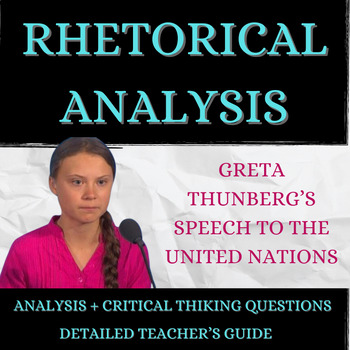Rhetorical Appeals in Modern Speeches | Greta Thunberg's Climate Change Analysis
- PDF
Also included in
- Help your students understand rhetorical appeals by analyzing modern speeches by current, relevant public figures (great for Women's History Month!). Skills covered throughout these activities include the ability to identify key rhetorical devices such as ethos, pathos, logos, anaphora, allusion, rePrice $8.95Original Price $9.95Save $1.00
Description
Help your students understand and apply rhetorical analysis concepts through a modern speech (2019) given by a fellow young person.
On September 23, 2019, at the United Nations Climate Action Summit, the then 16-year-old climate activist Greta Thunberg gave an impassioned speech to world leaders about the pressing matter of climate change.
Included in this lesson:
✅ six rhetorical analysis questions about the speech
✅ three critical thinking questions
✅ a detailed key to aide the teacher in discussing the speech with the class
Through this lesson, students will apply the following concepts/terms.
✅ ethos, pathos, and logos
✅ rhetorical situation (speaker, audience, occasion, purpose)
✅ anaphora (repetition) and its rhetorical effect
✅ main idea/message of the speaker
✅ call to action
✅ argument and counter argument
Need additional rhetorical analysis activities? Click here to scroll through my entire collection of rhetorical analysis lessons: https://www.teacherspayteachers.com/Store/Perkinz-With-A-Z-Education/Category/Rhetoric-and-Rhetorical-Analysis-1253717



